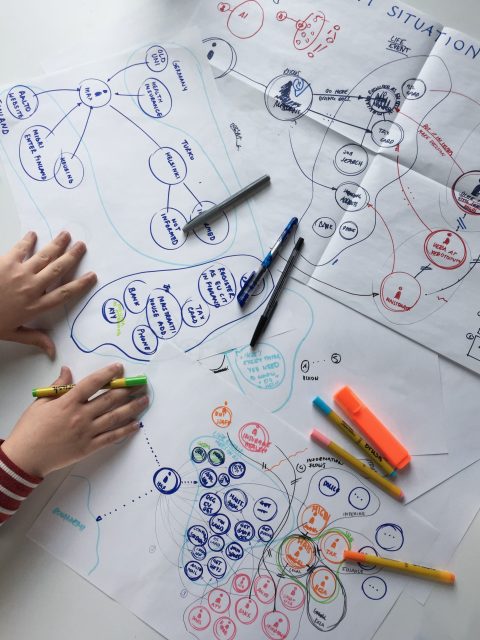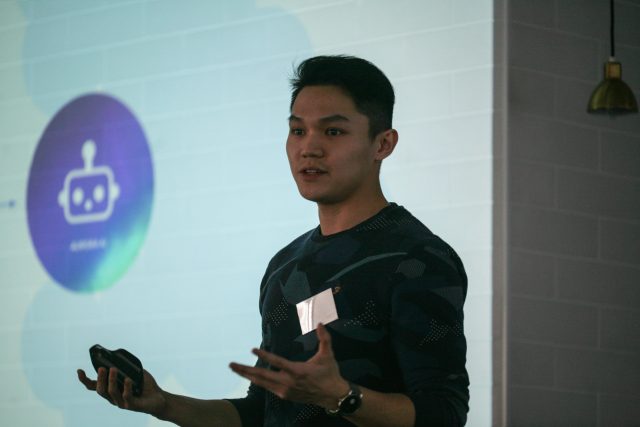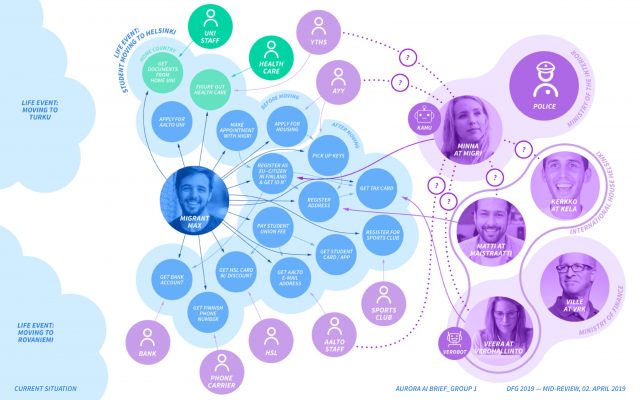This blog post reports on work-in-progress within the DfG course! The post is written by one of the two groups dealing with the Ministry of Finance’s brief on citizen empowerment through AI. The group includes Hoai Van Chu from Aalto’s IDBM program, Eva Duran Sanchez from Aalto’s Creative Sustainability program, Christopher Gros and Nehal Jain from Aalto’s Collaborative and Industrial Design program, and Nina Karisalmi from Aalto’s Strategic Usability research group.
Over the past few weeks, we have delved deeper into the world of civil servants and artificial intelligence (AI) by conducting and analyzing various interviews with relevant experts from service agencies, NGOs, and private companies. As per the structure of the DfG course, we have shifted our focus from looking at human and societal needs, to a more systemic view – a wide view of AuroraAI and the different service providers and institutions involved in the ecosystem.
Our interviews included: Anni Leppänen formerly from Verohallinto; Susanne Meissner from Inland Design; Mari Tammisaari from Aalto University; civil servants at the International House Helsinki; Katri Korhonen from Sitra; Konstantin Vdovenko from Accenture; Meeri Haataja from Saidot.

As we interviewed, ideated, drew and mapped, we began to identify issues that exist within the system that posed issues for the concept of AuroraAI to be impactful.
“For every single thing more than one organization is involved. But everybody seems to be just concerned with their own stuff.” – a civil servant
As a result, for our mid-review presentation, we decided to focus our on what the system would look like for it to be optimal for AuroraAI, and then contrasting that with the current situation through a simplified case study of an EU migrant coming to Finland to study. While the case of a student will not be our focus, it served as a baseline for us to build on once we do choose a specific direction and it also meant that we could kickstart our research into the process sooner since two of our members are already part of this segment.

We presented the case study through a storytelling format and a visualization of the migrant’s journey, which made it easier for the audience to empathize with and understand the pain points. The overall feedback for our presentation was positive, the audience appreciated the coherence, storytelling and our approach towards the brief, however some of the audience that wasn’t as familiar with our brief had trouble grasping some parts, such as what AuroraAI actually is – and this is completely understandable as we ourselves have had lengthy discussions about this, but in the end we’ve decided to put aside pondering on what form AuroraAI would take and instead we’re concentrating on what goals it would aim to accomplish and what would be needed for that to happen.

In the end, we concluded with two lenses – Organizational and Behavioral, that would guide us in narrowing down our focus in the coming weeks. The organizational lens would look at establishing channels and ways of collaboration, communication and data sharing between different institutions and organizations, whereas the behavioral lens focuses on a mindset and work culture change that is required from these institutions.
The DfG course runs for 14 weeks each spring – the 2019 course has now started and runs 26 Feb to 21 May. It’s an advanced studio course in which students work in multidisciplinary teams to address project briefs commissioned by governmental ministries in Finland. The course proceeds through the spring as a series of teaching modules in which various research and design methods are applied to addressing the project briefs. Blog posts are written by student groups, in which they share news, experiences and insights from within the course activities and their project development. More information here about the DfG 2019 project briefs. Hold the date for the public finale 09:00-12:00 on Tuesday 21 May!
